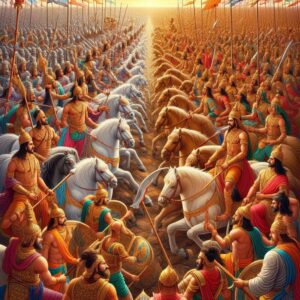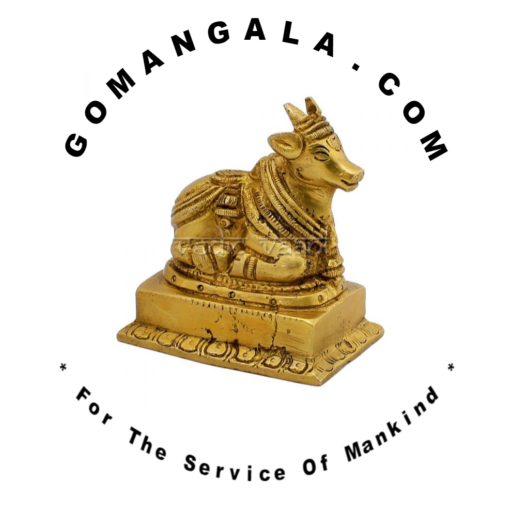Sena Niryana Parva is the fifty sixth Upa parva included in the fifth Maha parva named as Udyoga parva. Vaishampayana continued narration to Janamejaya in reply to his queries as follows.
What Krishna told to Yudhishtira after returning from Hastinavati?
Krishna returned from Hastinavati, reached Upaplava and resided in the camp of Satyaki. After his evening prayers and having food, he met with Yudhishtira. Krishna started discussions with him and called his Pandava brothers. Krishna told Yudhishtira about his attempts for avoiding war and to maintain peace in the society. He explained how he had come out of the court session hall when Duryodhana was about to order his arrest by Dushasana and Shakuni. He also explained about the helplessness of Karna and Vidura.
Then he announced the message of Kunti for Yudhishtira and her Pandava sons. Kunti had taught them with good education for conducting efficient public administration and social services but not for begging. He also conveyed the entire message to Draupadi. Since the military defensive arts were imparted to them by Drona, they were his disciples. The student should be more shining in the field of learnt subjects and the teacher when defeated by his own students in the same pedagogical field, he would certainly feel happier. The time for using the skills of Pandava brothers would be fast approaching, so conveyed to be cautious and prepared.
Who were the seven commanders in chief of the seven Akshohini soldiers?
The seven commanders in chief of the seven Akshohini soldiers were identified in consultations mutually. Yudhishtira was a capable warrior but not allotted any army leadership. Karna and Krishna were not participating as active soldiers in the war, hence Arjuna was also not allotted any army leadership. After honouring Krishna, Yudhishtira ordered the word ‘yoga’ as the soldiers would be aligned to march in the troops. Arjuna was in the front, leading the troops towards Kurukshetra. Yudhishtira was in the middle, sitting on the chariot fixed with a white umbrella to be seen by the entire troops, marching towards the Kurukshetra.
द्रुपदश्च विराटश्च दृष्टद्युम्नशिखण्डिनौ ।
सात्यकिश्चेकितानश्च भीमसेनश्च वीर्यवान् ॥
Meaning: Drupada, Virata, Drishtadyumna, Shikhandi, Satyaki, Chekitana and Bhima were the seven Commanders in chief for the soldiers for Yudhishtira.

The troops started, and were marching from Upaplava to Kuruksheta for a few days camping in the middle where water was available for them sufficiently.
What Duryodhana told to Bhishma after return of Krishna from Hastinavati?
Duryodhana told to Bhishma to arrange the eleven Akshohini soldiers befitting to serve him as the Emperor at Hastinavati. He told Bhishma would be shining like the Indra of heaven. Once, Parashurama was also defeated by Bhishma. After returning of Krishna from Hastinavati, the omens seen were very bad so Duryodhana told to be vigilant while Bhishma was preparing the armies for the war, to protect his throne in the Hastinavati palace. Duryodhana ordered in general to Bhishma to protect his palace as per his old oath.
What were the conditions for camping and moving the troops of soldiers?
The availability of water and facility for food were the main conditions for camp of the troops. Only in day time, troops were moving under army discipline. Soldiers with weapons were moving in pace with slow moving horses, four in number near the four legs of each horse. Elephants and chariots were carrying luggage. Medicines, clothes and all required utensils were carried along with them. Also the helpers and medical staff followed them.
What was the difference in the commanders of armies on either side?
The arrangements made in the systems of armies depend on the skills of the commanders in chief of the armies, and the final victory also depends on it. Only one man, Bhishma was the leader for Duryodhana and the entire eleven Akshohini soldiers had to obey him. The Mahabharata war was fought for eighteen days. On the tenth day, Bhishma had fallen.
Then for the next three days, Drona was the leader for Duryodhana and the entire eleven Akshohini soldiers had to obey him. On the thirteenth day, Drona had fallen. Then for the next two days, Karna was the leader for Duryodhana and the remaining eleven Akshohini soldiers had to obey him. On the fifteenth day, Karna had also fallen. Then for the next two days, Shalya was the leader for Duryodhana and the remaining balance of eleven Akshohini soldiers had to obey him.
On the seventeenth day, even Shalya had also fallen, and then there was no commander on the side of Duryodhana. Dushasana had to fight with Bhima using mace without any escorts but finally was brutally killed when Droupadi had appeared there. Thereafter, for the next day, only Duryodhana was the warrior for himself and the entire war field was filled with dead corpse, all eleven Akshohini soldiers being killed. On the eighteenth day morning, the army intelligence of Yudhishtira had reported him the presence of Duryodhana, hiding under the palace water tank but he was ready with a mace for fighting with Bhima.
On the side of Yudhishtira, there were seven commanders in chief for each of the Akshohini soldiers. Moreover, Yudhishtira was planning with specific experts against the specific targeted enemies. On the tenth day, Shikhandi was brought in the front row and Bhishma was discouraged. On the eleventh day, Abhimanyu was brought in the front row and Drona was discouraged. On the thirteenth day, Yudhishtira was defeated by Karna, so he got down from his own elephant named as Ashwathama, brought it in front of the row. After killing the elephant Ashwathama by Bhima, stood in own side, Drona was killed by Drishtadyumna, But failure of Yudhishtira had not been reported to Duryodhana since his desire was to defeat Arjuna, not Yudhishtira.
On the fifteenth day, Arjuna was brought in the front row and Karna was killed by him. On the seventeenth day, Bhima was brought in the front row and Dushasana was killed after Shalya died. Even though Shalya was a very powerful warrior, he was slow moving but aimed an arrow towards Yudhishtira, where, Yudhishtira had defended himself by throwing a spear to his chest along with aiming the Bhargavastra arrow from his Vijaya bow. Shalya could not withstand the double attack and died. Thus was the difference in the commanders of armies on either side. Finally, on the eighteenth day, Duryodhana was alone and hidden under water inside the palace sarovar with a mace in hand.
Who was the commander in chief of the eleven Akshohini soldiers?
Bhishma was the commander in chief of the eleven Akshohini Soldiers. He was a sincere devotee of Krishna and he knew Yudhishtira would be leading and winning.
Why Kurukshetra, a place away from Hastinavati was selected by Duryodhana?
Only armies should be involved in the war but not ladies, children or any other civilians in the Hastinavati palace or town. Hence, Kurukshetra, a place away from Hastinavati but near to the palace water tank was selected by Duryodhana for the Mahabharata war. The camping ground was measured by Dushasana and Shakuni and the battle field was also fixed, as determined by Duryodhana.
How was the ancient war camp for Mahabharata arranged?
The ancient war camp for Mahabharata war was very well arranged in all respects befitting for the Emperors. In the camp, for each and every soldier, there was military food, defensive armoured clothes, and comforts for sleeping arrangements. Daily morning and evening prayers were allowed with full freedom. The services of expert doctors and male nurses were available for the needy. For the elephants and horses, sufficient food were available in their camps. Some workers were taking care of the movements of elephants separately, allotted specially for the specific purpose. Perfect light and water provisions were accessible to all. Each and every army camps were like temporary palaces for the troop leaders. Chariots were checked frequently by the expert mechanics for smooth running.
Who were left behind in Upaplava after the movement of troops?
Draupadi remained with Uttarakumari along with soldiers for security and essential food-providing staff at Upaplava after the movements of troops. Until the fall of Bhishma, the reserve force of Yudhishtira was also camping there.
What were discussed in the camp of Yudhishtira in front of Krishna?
In the camp of Yudhishtira, the commanders in chief of armies had discussed about the capabilities of the persons in the Kurukshetra, in front of Krishna. Krishna had announced about the final victory in advance so they were feeling happy to move in troops.
How was the border of the area of Duryodhana transgressed by Yudhishtira?
The securities arranged by Bhishma were very strong and the soldiers had tried to block the troops of Yudhishtira at the border area of Duryodhana. After the exile of thirteen years, Yudhishtira and his brothers were returning to their own birth place and hence it was their birth right to enter the Hastinavati palace. Arjuna was moving in the front and he had replaced them all by the new soldiers of Yudhishtira. The old security soldiers were utilized as casual messengers and sent to the palace at Hastinavati with instructions to report to Bhishma about the return of Pandava brothers escorted with troops movements. There was no violence and the border security soldiers ran away very fast to Hastinavati for reporting.
Why Yudhishtira also selected Kurukshetra, a place away from Hastinavati?
Only soldiers in armies should be involved in the war but not ladies, children or other civilians in the Hastinavati palace or town. Hence, Kurukshetra, a place away from Hastinavati but near to Hiranmayi River was selected by Yudhishtira for the Mahabharata war. The seven camping ground was selected separately by the respective commanders in chief of their Akshohini regiments. Food and rest for soldiers were ensured fully and the battle field was at hand of the other side.
Next post, Mahabharat: Bhishmabhishechana Parva would be more interesting.
Mahabharat: Ulukadutagamana Parva would be presented separately in another article.
On reading this story, children would gain more memory power, great moral strength in their life in future; create a sense of self- reliance leading to peace and progress.
It is humbly prayed for the blessings of God Krishna upon us.
Readers may share this story with children, friends and family.

Leave a Reply